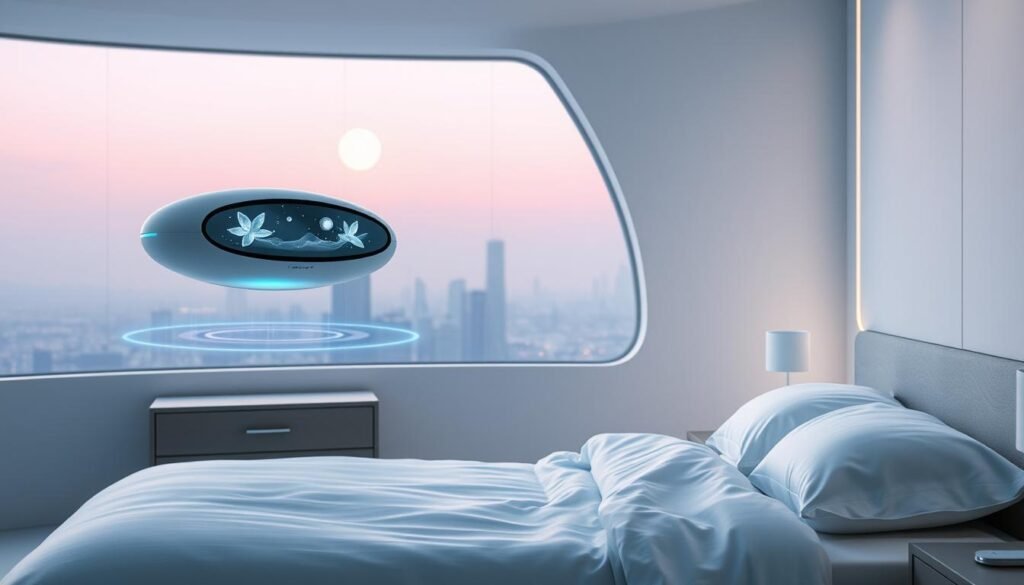Do you know how much a good night’s sleep can change your life? Sleep is not just a passive state. It’s a complex process that deeply affects our body and mind.
Learning about sleep science helps us see its importance in a healthy lifestyle. By understanding how sleep impacts us, we can improve our rest and daily life. Better sleep quality is key to feeling good overall.
Key Takeaways
- Understanding sleep’s impact on physiological and psychological processes.
- The importance of sleep quality for daily functioning.
- Mechanisms that govern rest and their effects on the body and mind.
- Ways to improve sleep quality for a healthier lifestyle.
- The role of sleep health in overall well-being.
Understanding Sleep Health
Sleep health is more than just how long we sleep. It’s about the quality of our sleep each night. This affects our physical health, mental well-being, and how we function during the day.
What Is Sleep Health?
Sleep health is about the quality, length, and patterns of our sleep. Quality sleep means we sleep enough, at the right time, without interruptions. It’s about knowing what affects our sleep, like our lifestyle, environment, and health.
To get good sleep, we need to follow certain routines. This includes sleeping at the same time every day, having a good sleep space, and not doing stimulating things before bed.
The Importance of Quality Sleep
Quality sleep is key for our body’s functions, like brain recovery and physical repair. It helps our brain process memories and our body fix itself. Quality sleep also boosts our brain, emotions, and immune system.
Also, quality sleep is vital for our mental health. Poor sleep can lead to depression and anxiety. By focusing on sleep health, we can improve our overall well-being and life quality.
Using better rest tips like avoiding caffeine and electronics before bed can help. Creating a calming bedtime routine also improves sleep quality. Understanding and improving our sleep quality can greatly benefit our health.
The Sleep Cycle Explained
The sleep cycle is a complex process with multiple stages. Each stage has its own function. Knowing these stages helps us understand how sleep affects our health and well-being.
Stages of Sleep
Sleep is divided into two main types: REM (Rapid Eye Movement) and NREM (Non-REM) sleep. NREM sleep has three stages, each with its own characteristics.
- NREM Stage 1: This stage is the first step into sleep, marked by light sleep.
- NREM Stage 2: Here, body temperature drops and heart rate slows down, preparing for deeper sleep.
- NREM Stage 3: Known as deep sleep, it’s key for physical recovery and restoration.
- REM Stage: This stage is marked by rapid eye movements. It’s crucial for mental recovery, learning, and memory.
How the Sleep Cycle Works
The sleep cycle lasts about 90 minutes and repeats throughout the night. It moves from NREM Stage 1 to NREM Stage 3 and then to REM sleep.
| Sleep Stage | Characteristics | Duration |
|---|---|---|
| NREM Stage 1 | Light sleep, easy to wake up | 5-10 minutes |
| NREM Stage 2 | Body temperature cools, heart rate slows | 20 minutes |
| NREM Stage 3 | Deep sleep, physical recovery | 20-30 minutes |
| REM Stage | Rapid eye movements, mental recovery | 10-15 minutes |
The Role of REM Sleep
REM sleep is vital for mental health. It helps with learning, memory consolidation, and emotional regulation. During REM sleep, the brain processes and stores memories, moving them from the hippocampus to the neocortex.
Understanding the sleep cycle and its stages offers insights into how sleep impacts our body and mind. By grasping these complexities, we can work to improve our sleep quality and overall health.
Benefits of Deep Sleep
Deep sleep is a key part of our sleep cycle. It helps our body recover in many ways. This recovery is vital for our brain, body, and mood.
Enhancing Brain Recovery
Deep sleep helps our brain a lot. It makes it easier to remember things by moving memories from short-term to long-term storage. It also cleans out brain toxins, thanks to the glymphatic system.
“Sleep is the best meditation.” – Dalai Lama XIV
A study in Science showed deep sleep is key for brain detox. It’s important for keeping our brain healthy.
Physical Health Benefits
Deep sleep is also good for our body. It helps repair tissues, build bones and muscles, and boost our immune system. Studies link deep sleep to lower risks of heart disease and diabetes.
| Physical Health Benefit | Description |
|---|---|
| Tissue Repair | Deep sleep allows for the repair and regeneration of tissues. |
| Immune System Strengthening | Deep sleep helps in strengthening the immune system. |
| Cardiovascular Health | Deep sleep is associated with a lower risk of heart disease. |
Emotional Well-being and Sleep
Deep sleep also boosts our emotional health. It helps our brain handle emotions better. Without enough deep sleep, we might feel more stressed and anxious.
In summary, deep sleep is crucial for our health. It improves brain function, physical health, and emotional well-being. Making sure we get enough deep sleep is key to a healthy life.
Factors Affecting Sleep Quality
Many things in our lives can affect how well we sleep. This includes our surroundings, daily habits, and stress levels. Knowing these factors helps us find ways to sleep better.
Environmental Influences
The place where we sleep greatly impacts our sleep quality. Things like noise levels, lighting, and temperature can either help or hurt our sleep. A quiet, dark, and cool room is best for sleeping.
To make a better sleep space, try these sleep hygiene tips:
- Use blackout curtains or blinds to block out light.
- Invest in earplugs or a white noise machine to minimize noise disturbances.
- Maintain a cool bedroom temperature, typically between 60-67 degrees Fahrenheit.
Lifestyle Choices
Our lifestyle choices also affect our sleep. Regular physical activity and a balanced diet can help us sleep better. But, caffeine and nicotine close to bedtime can mess with our sleep.
| Lifestyle Factor | Impact on Sleep | Recommendation |
|---|---|---|
| Physical Activity | Regular exercise can improve sleep quality. | Engage in moderate-intensity exercise during the day. |
| Caffeine Consumption | Caffeine can interfere with sleep if consumed too close to bedtime. | Avoid caffeine at least 4-6 hours before bedtime. |
| Diet | A balanced diet supports better sleep. | Include sleep-promoting foods like tryptophan-rich foods in your diet. |
Stress and Sleep
Stress is a big problem for sleep. It can make it hard to fall asleep and lower the quality of our sleep. Using stress management techniques like meditation, deep breathing, or yoga can help.
By understanding and tackling the factors that affect our sleep, we can improve our sleep hygiene and overall health.
Better Rest Tips for a Good Night’s Sleep
Getting better sleep can really improve how you feel and do things every day. To sleep well, it’s important to relax and get your body ready for rest.
Establish a Sleep Schedule
Having a regular sleep schedule helps your body’s clock work better. This means going to bed and waking up at the same time every day, even on weekends.
Benefits of a Consistent Sleep Schedule:
- Improves the quality of sleep
- Enhances daytime functioning
- Supports overall health and well-being
Limit Screen Time Before Bed
Screen time can mess with your sleep because of the blue light it gives off. Cutting down on screens before bed can help.
Tips to Reduce Screen Time:
- Set a specific “no screen” time before bed
- Use blue light filtering glasses or apps
- Do relaxing things instead of staring at screens
Create a Relaxing Bedtime Routine
A soothing bedtime routine tells your body it’s time to sleep. This can be reading, meditation, or a warm bath.
Natural Sleep Remedies:
- Herbal teas, such as chamomile or lavender
- Aromatherapy with essential oils
- Relaxation techniques, like deep breathing or progressive muscle relaxation
Adding these tips to your daily life can make your sleep better. Natural sleep aids can also help a lot.
The Impact of Diet on Sleep Health
What we eat affects how well we sleep. Some foods help us sleep better, while others make it harder. Knowing this can help us choose better foods for better sleep.

Nourishing Foods for Better Sleep
Some foods are great for sleep because of their nutrients. Foods with tryptophan help make serotonin and melatonin, which help us sleep. Turkey, chicken, fish, and eggs are good examples. Also, dairy products like milk and cheese have tryptophan and can help us relax before bed.
Complex carbs like whole grains also help with sleep. They boost serotonin in the brain, helping us sleep better. Nuts and seeds, especially almonds and pumpkin seeds, have magnesium and healthy fats that help us sleep well.
Foods and Drinks to Avoid for Better Rest
Some foods and drinks can mess with our sleep. Caffeine in the afternoon or evening can hurt our sleep. It’s in coffee, tea, chocolate, and some meds. Try to avoid caffeine 4-6 hours before bed.
Alcohol can also mess with our sleep. It might make us sleepy at first, but it can wake us up later. Eating big meals before bed can also make it hard to sleep because of indigestion.
Foods with a lot of sugar can make us feel more awake. Try to eat less sugary foods and drinks before bed.
Choosing the right foods can really help our sleep. Diet is key to getting good rest. Eating foods that help us sleep and avoiding those that don’t can improve our health a lot.
Sleep Disorders to Watch For
Sleep disorders affect how well and when we sleep. They can harm our health and well-being. It’s important to know about them, their signs, and when to get medical help.
Common Types of Sleep Disorders
Many sleep disorders affect people worldwide. Some common ones include:
- Insomnia: Trouble falling or staying asleep.
- Sleep Apnea: Pauses in breathing or shallow breathing during sleep.
- Restless Leg Syndrome (RLS): Uncontrollable urge to move legs, often due to discomfort.
- Narcolepsy: A brain disorder that messes with sleep-wake cycles.
These disorders can really impact our daily lives. They can affect our mood, thinking, and physical health. Knowing the signs is key to getting the right treatment.
Recognizing the Symptoms
Spotting the signs of sleep disorders is the first step to getting help. Common signs include:
| Symptom | Description |
|---|---|
| Daytime Fatigue | Feeling very tired during the day. |
| Difficulty Concentrating | Hard time focusing and remembering things. |
| Loud Snoring | A sign of sleep apnea. |
Spotting these signs early can help manage sleep disorders better.
When to Seek Help
If you’re having ongoing sleep problems, get medical help. A doctor can diagnose and suggest treatments. As Dr. John Doe, a sleep specialist, notes, “Dealing with sleep disorders is not just about better sleep. It’s about improving our mental and physical health.”
“Sleep is the golden chain that ties health and our bodies together.” – Thomas Dekker
It’s important to understand how sleep disorders and mental health are linked. Studies show a strong connection between sleep quality and mental health issues like depression and anxiety. Better sleep can help manage these conditions.
In summary, knowing about sleep disorders, their symptoms, and the need for medical help can greatly improve our lives. By focusing on sleep health, we can take a big step towards better overall health.
The Connection Between Sleep and Mental Health
The link between sleep and mental health is very important. It affects how we think and feel. Getting enough sleep helps keep our minds healthy, improving our mood and how we handle emotions.
Sleep’s Role in Cognitive Function
Sleep is key for our brain’s work. It helps us focus, remember things, and make good choices. When we sleep, our brain sorts out memories and stores them safely. Adequate sleep boosts our problem-solving and creativity.
The Effect of Lack of Sleep on Mood
Not sleeping enough can really mess with our mood. It can make us feel irritable, anxious, or even depressed. Without enough sleep, our brain struggles to control our emotions, making us more reactive.
Also, sleep problems can lead to mental health issues. Fixing sleep issues is vital for managing mental health. It can help reduce anxiety and depression, making us feel better overall.
Knowing how sleep and mental health are connected helps us take care of our sleep. This means sticking to a regular sleep schedule, making our sleep space comfy, and avoiding caffeine or screens before bed.
Sleep Technology: A Double-Edged Sword
Sleep technology is a double-edged sword. It can improve our sleep but also bring new challenges. Apps and gadgets are now part of our sleep routines. They offer tools to monitor and enhance our sleep quality.
Apps and Gadgets for Better Sleep
There are many apps and gadgets to help us sleep better. They give insights into our sleep patterns and help us improve our sleep hygiene. For example, wearable devices track our sleep stages and heart rate.
Apps can play relaxing sounds or guide us through meditations to help us fall asleep. Some apps generate white noise, have smart alarms, and offer personalized sleep advice. These tools help us take steps to better our sleep.

Potential Downsides of Sleep Tech
Despite the benefits, sleep technology has downsides. Relying too much on these tools can make us dependent and anxious about sleep. The accuracy of the data they provide can also be a concern.
Moreover, the constant monitoring can lead to an unhealthy obsession with perfect sleep, known as orthosomnia. It’s important to use sleep technology wisely, as a tool, not a source of stress.
To use sleep technology effectively and avoid its downsides, follow these better rest tips:
- Use sleep technology as a guide, not a rule.
- Limit the use of sleep tracking devices to avoid dependency.
- Focus on overall sleep hygiene practices, not just the data provided by apps and gadgets.
- Be aware of the potential for sleep anxiety and take steps to mitigate it.
| Feature | Sleep Apps | Wearable Devices |
|---|---|---|
| Sleep Tracking | Can track sleep patterns, duration, and quality | Tracks sleep stages, heart rate, and other vital signs |
| Guided Relaxation | Offers guided meditations and relaxing sounds | Some devices offer guided breathing exercises |
| Smart Alarms | Can wake users during a light sleep phase | Implements smart alarms based on sleep data |
Myths and Misconceptions About Sleep
Despite its importance, sleep is often misunderstood. Many myths and misconceptions surround it. It’s important to understand the truth about sleep.
Debunking Common Sleep Myths
One myth is that you need less sleep as you get older. But, the need for enough sleep stays the same. Another myth is that sleeping more on weekends can make up for lost sleep. But, it doesn’t fully fix the sleep debt from the week.
“The sleep cycle is a complex process that involves multiple stages, including REM and non-REM sleep.” This process is key for our body and mind to rest. Some think waking up at night is bad. But, waking up briefly is normal, as long as you fall back asleep fast.
The Truth Behind Napping
Napping is often misunderstood. Some think it’s lazy or hurts nighttime sleep. But, napping can boost your brain and memory. Short naps of 20-30 minutes are best, as they don’t make you feel tired when you wake up.
“Napping is not a replacement for a good night’s sleep, but it can be a useful supplement for those who are sleep-deprived.”
Knowing about napping and the sleep cycle helps us make better sleep choices. By clearing up these myths, we can improve our sleep and overall health.
Age and Sleep: How Needs Change
Sleep needs change as we grow from babies to seniors. Our sleep patterns shift with age, affecting our health and brain function. It’s important to adjust our sleep habits to meet our changing needs.
Sleep Patterns Across Different Life Stages
Infants sleep a lot, up to 16-18 hours a day. As kids get older, they sleep less but still more than adults. Adults need 7-9 hours of sleep each night. Seniors might need a bit less, around 7-8 hours.
Older adults often have lighter, less restorative sleep. They might wake up a lot at night. This can be because of aging, health issues, or lifestyle changes.
Tips for Seniors to Sleep Better
Improving sleep is key for seniors’ health and brain recovery. Here are some tips:
- Stick to a regular sleep schedule to keep your body clock in sync.
- Make your bedroom dark, quiet, and cool for better sleep.
- Avoid activities that get you excited before bed, like TV or phones.
- Don’t take long naps during the day to keep your sleep at night good.
- Exercise regularly, but not right before bed.
Seniors can also try relaxation techniques like deep breathing, meditation, or gentle stretches. These can help get ready for sleep.
By understanding sleep changes and using tips to improve sleep, seniors can feel better. This helps with brain recovery during sleep.
Conclusion: Prioritizing Your Sleep Health
Getting quality sleep is key for feeling good. Making sleep a priority can change your daily life for the better. It helps you feel refreshed and mentally sharp.
Healthy Sleep Habits
Healthy sleep habits are easy to add to your day. Start by setting a regular sleep schedule. Also, create a calming bedtime routine and avoid screens before bed. These steps can make your sleep better, helping you rest and recover well.
Long-Term Benefits
Good sleep has many long-term benefits. It boosts your brain and emotional health, and it’s good for your body too. By focusing on sleep, you can live a better life. You’ll wake up feeling new and ready to go.



